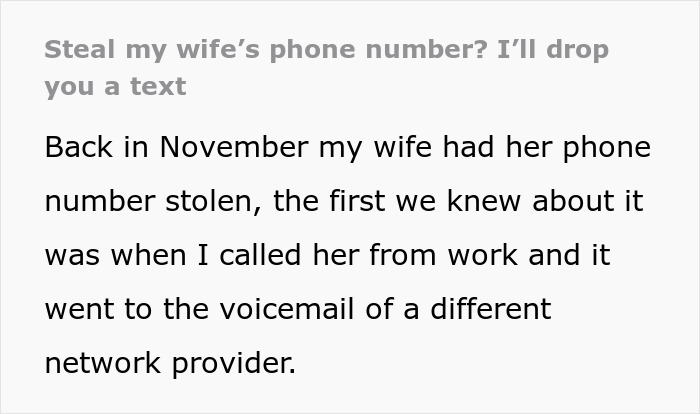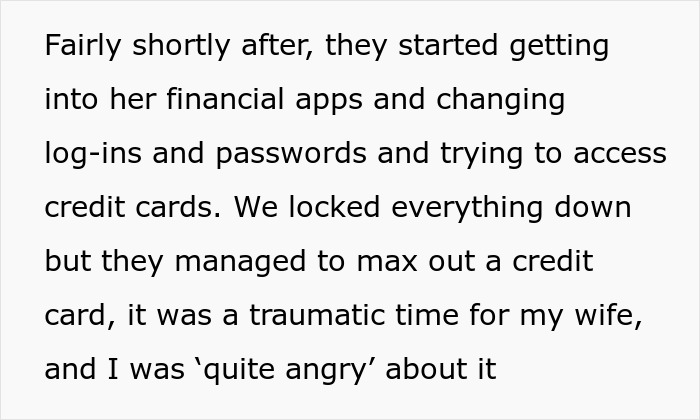[ad_1]
Phone numbers are a way to connect with others in the modern world. While we use them daily for communication, there’s more to them than we may realize. Because they are unique and often associated with a single person, they’ve become an almost perfect form of identifying an individual. However, this makes us an easily accessible target for scammers, who often use these randomized digits to carry out financial fraud, identity theft, and so much more.
Redditor Semiphonic learned this the hard way after his wife’s phone number was stolen and her credit cards were maxed out. This being a traumatic and infuriating experience for both of them, the husband wasn’t going to let this slide, so he came up with a petty revenge plan to play a little game on the con artists.
Phone numbers have become a part of our identity, making us susceptible to fraud
Image credits: Karolina Grabowska / Pexels (not the actual photo)
But when this woman’s phone number got stolen, her husband didn’t let the scammers get away with it so easily
Image credits: charlesdeluvio / Unsplash (not the actual photo)
Image credits: semiphonic
Often, people aren’t aware of phone porting, which makes it extremely frightening
The kind of scam that this couple experienced is called phone porting fraud. It happens when someone finds enough of your information to have your mobile phone number transferred over to another device, gaining access to your bank accounts. People usually do this because they need to change phone companies and want to keep the same digits, and scammers have learned to take advantage of this.
IDCARE, Australia’s and New Zealand’s national identity and cyber support service, explains that a criminal contacts a different telephone provider, impersonates the authorized account owner, sets up a new one with them, and asks for the number to be moved.
The organization adds, “Once a mobile number has been successfully taken over, criminals will receive your text messages, including those containing password resets and verification codes. This gives them access to your existing online accounts, with banking and email accounts being major targets.”
Phone porting fraud is often confused with SIM swapping, where a phone number is transferred to a scammer’s new SIM card. In instances where there’s a legitimate reason to request a duplicate of a SIM card, like malfunctioning or misplacement, a provider’s team may transfer the phone number to a new one. Exploiting this, criminals gain access to personal information through online accounts like email.
Such swindling is often invisible, and the actual owner of those digits isn’t aware that it’s happening, making it extremely scary. Phone porting is a crime also classified as identity theft, which was ranked by Scamwatch as the third most recurring scam in 2023. Around 7,000 cases of identity theft were reported to Scamwatch in the first four months of last year, costing Australians more than $5 million.
Suspicious activity on social media, email, or bank accounts might be a sign of phone porting
Nord VPN, a virtual private network service, lists several signs alerting you that you’re under attack by phone number scammers:
- You are only able to make emergency calls.
- Your service completely disappears.
- You’ve been notified that your phone doesn’t recognize the SIM card.
- You’ve noticed suspicious activity on social media, email, or bank accounts.
The company emphasizes that in such situations, time is essential and urges people not to ignore these signs. The quicker you take action, the more likely you’ll be able to protect your savings. For this, try contacting your carrier immediately to find out what’s happening. If your number has been ported, they’ll help you get it back or block it for some time.
In addition, if you have noticed something suspicious, change your passwords and warn your bank. They may temporarily freeze your account, as that might be the best solution. Lastly, it might be a good idea to contact the police and provide them with any evidence of malicious activity in your accounts.
However, it’s better to be prepared in advance than try to control the damage that’s already been done. Of course, most companies have protection against unauthorized phone porting, but some are still easier to deceive than others. What you can do yourself, according to Nord VPN, is increase your account’s safety by adding passwords or PIN codes where it’s possible.
Something else that is beneficial is limiting your information online, which can be gathered by these port-out criminals. Finally, they recommend surfing the net responsibly, i.e., refraining from clicking unfamiliar links, avoiding connecting to public Wi-Fi, and being more cautious about what you download on your devices.
Fraud investigators weighed in in the comments and the author shared more details on the situation
[ad_2]
Source link











